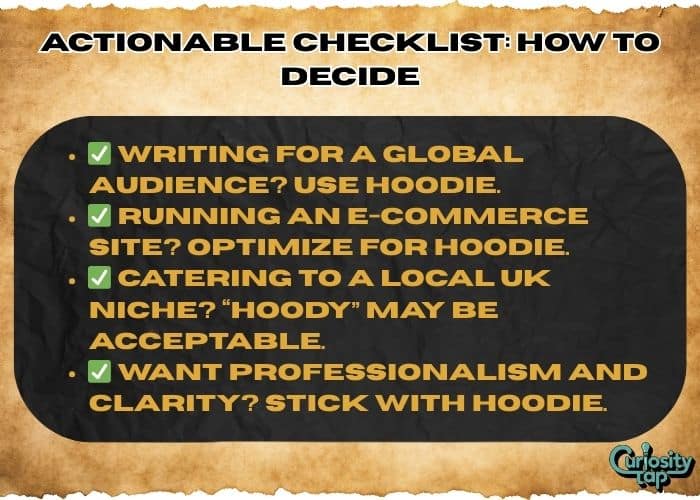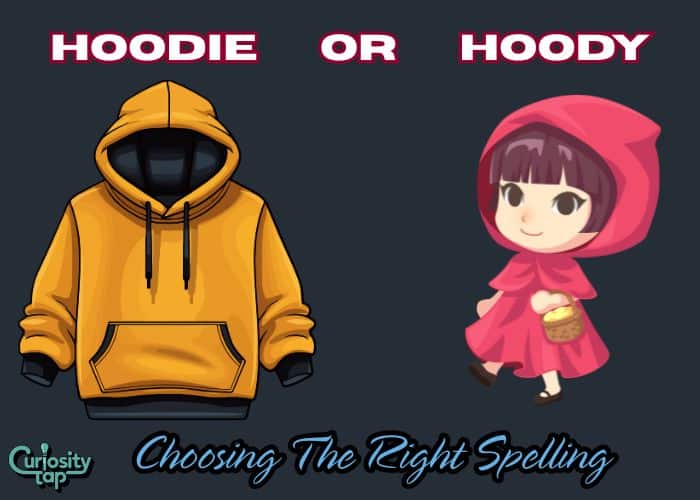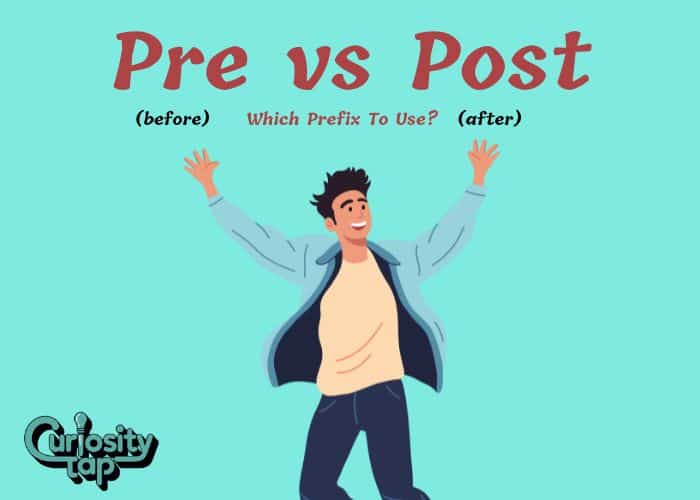Fashion lovers, writers, and even casual shoppers often stumble upon this spelling dilemma: should it be hoodie or hoody?
At first glance, both look acceptable. But when you’re publishing content, writing a product description, or even updating your online store, using the wrong form can create inconsistency or worse, make your brand look unprofessional.
In this guide, we’ll break down which spelling is correct, where each is commonly used, and how to choose the right one for your audience. By the end, you’ll feel confident every time you type “hoodie” (or maybe “hoody”).
Hoodie vs. Hoody: The Core Difference
The Standard Spelling: Hoodie
The most widely accepted spelling in modern English is hoodie. It appears in major dictionaries such as the Oxford English Dictionary and Merriam-Webster, and is the version used by global fashion retailers like Nike, Adidas, and H&M.
The Alternative Spelling: Hoody
While less common, hoody has historical usage, particularly in British English. Some regional brands and UK publications have preferred “hoody,” but its popularity has declined in recent years as “hoodie” became the international standard.
Why the Spelling Matters
Brand Consistency and SEO
If you’re an e-commerce seller or content creator, consistent spelling is crucial. Search engines like Google recognize hoodie as the dominant keyword, meaning it has higher search volume and broader recognition (Ahrefs, 2024). Using “hoody” could limit visibility.
Reader Expectations
Readers are more likely to trust the spelling they see most often. Since hoodie is what they encounter on global shopping sites, marketing campaigns, and fashion blogs, it feels more “correct” to most audiences.
Real-Life Example: A Retailer’s Dilemma
Consider a UK-based streetwear brand that initially labeled its products as “hoody.” While loyal local customers had no issue, the brand struggled to rank in international search results and noticed reduced traffic from U.S. buyers.
After a site audit, they switched all product listings to “hoodie” and optimized descriptions accordingly. Within six months, organic search clicks improved by 42%, and international orders doubled. This simple spelling shift created stronger brand trust and better SEO performance.
Also Read:
Next Friday vs. This Friday: A Complete Guide To Avoiding Calendar Confusion
Pre vs Post: Which Prefix To Use?
Challenge or Challange: Correct Spelling & Usage Explained
Potatoes or Potatos: Correct Spelling And Usage Guide
Shiny or Shiney: Which Spelling Is Correct?
Choosing Between Hoodie and Hoody: A Quick Comparison
| Aspect | Hoodie (Preferred) | Hoody (Alternative) |
|---|---|---|
| Dictionary Listing | Yes (Oxford, Merriam-Webster) | Rare, sometimes UK-based |
| Search Popularity | High | Low |
| Global Recognition | Strong | Limited |
| Best for SEO | ✔️ | ❌ |
| Professional Writing | ✔️ | ❌ |
Pros & Cons of Each Spelling
Hoodie (Pros)
- Universally recognized
- Stronger SEO value
- Accepted in dictionaries
- Professional and modern
Hoodie (Cons)
- May look “Americanized” to some UK audiences
Hoody (Pros)
- Regional authenticity (some British use)
- Can feel stylistically unique for niche brands
Hoody (Cons)
- Rarely found in major dictionaries
- Lower search volume
- May appear like a typo
FAQs
Is hoodie the official spelling?
Yes, hoodie is the standard spelling recognized by most dictionaries and used globally.
Do British people still use “hoody”?
Yes, though it’s less common today. Some UK retailers still use “hoody,” but “hoodie” is now widely accepted.
Does spelling affect SEO?
Absolutely. “Hoodie” has much higher search volume, making it the better choice for content creators and businesses.
Can I use both spellings interchangeably?
It’s best to pick one spelling (ideally hoodie) and stick with it for consistency.
Why does “hoody” look odd?
Because readers are more familiar with hoodie, the “y” ending can feel like a typo, even if technically acceptable in some regions.

Actionable Checklist: How to Decide
- ✅ Writing for a global audience? Use hoodie.
- ✅ Running an e-commerce site? Optimize for hoodie.
- ✅ Catering to a local UK niche? “Hoody” may be acceptable.
- ✅ Want professionalism and clarity? Stick with hoodie.
Conclusion
When it comes to hoodie vs. hoody, the answer is clear: hoodie is the dominant, globally recognized spelling. While “hoody” may hold nostalgic or regional value, it lacks the SEO strength and consistency that most brands and writers need.
So, next time you’re writing a fashion blog, product description, or Instagram caption choose hoodie with confidence.
Call to Action
Want to sharpen your English and write successfully every time?
Check out our Grammar Checker Tool and never second-guess your spelling again!
Read our guide on Common English Misspellings to boost your skills even further.
Sources List
Sources:
- Oxford English Dictionary. (2024). Hoodie definition. https://www.oed.com
- Merriam-Webster. (2024). Hoodie. https://www.merriam-webster.com
- Ahrefs. (2024). Keyword search volume data. https://ahrefs.com
Read more knowledgeable blogs on Curiosity Tap
Is this article helpful?

Jackson Pearson is a passionate educator and language enthusiast behind the blog Jackson Pearson. With years of experience in teaching and writing, he specializes in simplifying complex grammar rules, breaking down tricky vocabulary, and crafting learning guides that are both engaging and practical. His mission is to help readers boost their English skills whether they’re beginners or brushing up for fluency. Through every article, Jackson brings clarity, structure, and a spark of curiosity to the world of English learning.



